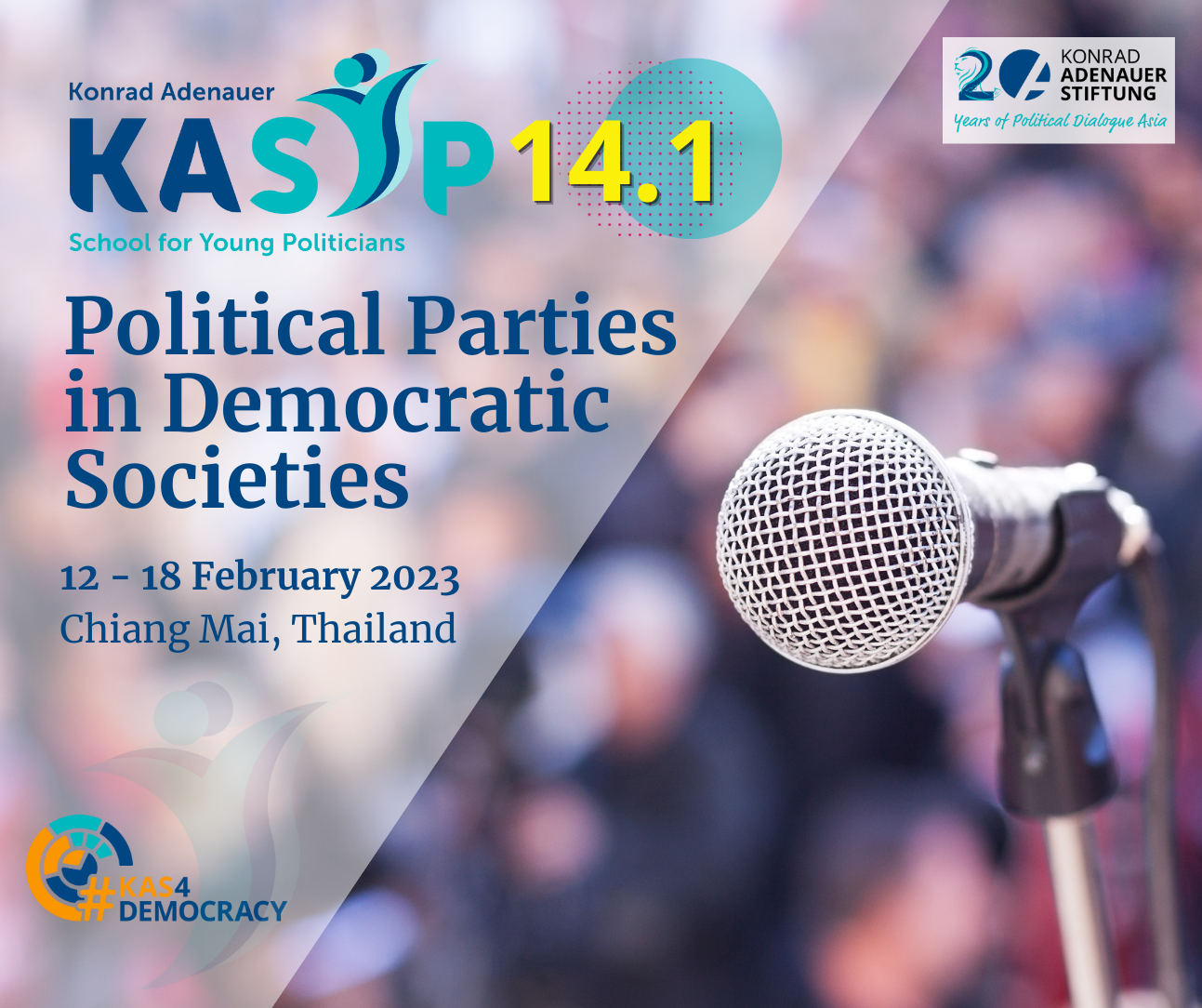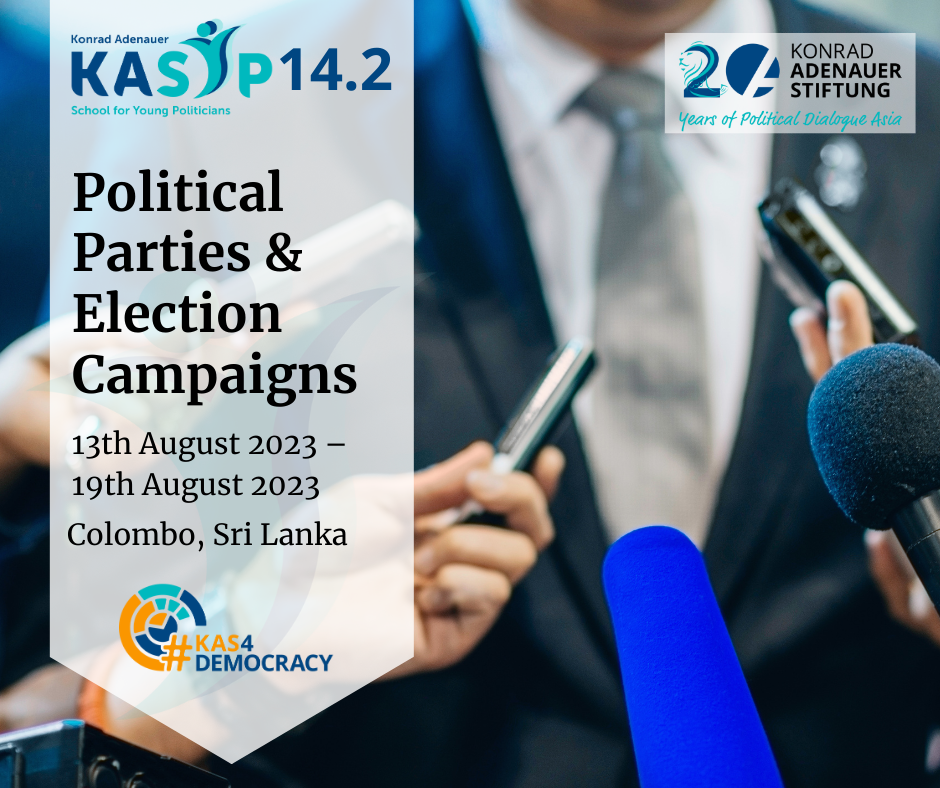The first module, Knowing Module (01): Political Party Functions and Organisations in Democratic Societies has the following three objectives: (i) to provide participants with background knowledge on the diverse political and party systems in Asia, (ii) to enhance communication and party platform development skills of participants, and (iii) to nurture democratic leadership qualities of young leaders through the BDL framework.
Core topics would include political ideologies, intra-party democracy, and political and party systems in Asia. To complement these core topics, there will be elective topics based on the learning needs of the participants. Options for the elective topics may include political dynasties, corruption, transparency and accountability, party financing, etc. Meanwhile, for skills training, participants will undergo a workshop on pitching, framing, storytelling, public speaking, and party platform development. The final input of module one will be a workshop on democratic leadership values through the Bridging Democratic Leadership framework. Session 01 of the BDL will focus on the topic of ownership.
Each module will have corresponding deliverables. For this module, the required output are the following: pitching, storytelling, and BDL outputs (leadership journey, leadership capital and development plan, giving voice to values, and public narrative).
- Student: KASYP Adenauer
- Student: Sultan Nisar Ahmad
- Student: Arpita Aparajita Badajena
- Student: Apolinario Jr Aspiras Bagano
- Student: Ruchira Chaturvedi
- Student: Chutinart Chinudomporn
- Student: Nauman Ul Haq
- Student: Andreas Michael Klein
- Student: Uthpala Saalinda Kurian
- Student: Minjun Kwak
- Student: Eric Chern Yuen Low
- Student: Fathima Aroosha Mohamed
- Student: Sugar Munkhtsooj
- Student: Anmol Panwar
- Student: Sandali Chamathka Bandara Ratnayake
- Student: Rojesh Rijal
- Student: Hamzah Salik
- Student: Changkyo Seo
- Student: Himanshu Sharma
- Student: Chanisara Sokan
- Student: Sasinan Thamnithinan
- Student: Chantha Thorn
- Student: Vineet Tyagi
- Student: Chan Wathanak Yong
- Enrolled students: 25
Module description and objectives
Election is a legitimate platform for transition of power between political leaders in a democratic system and electoral system and election campaigns are integral to the functioning of a competitive and fair election. In the current digital age, there are emerging challenges such as disinformation and the manipulation of the internet and social media, on top of existing issues of gerrymandering, and media suppression that threaten to distort the outcome of the election and potentially weaken the democratic institutions in Asia.
The Konrad Adenauer School of Young Politicians (KASYP) is a two-year training programme comprising four thematic modules aiming to strengthen and professionalise political parties. This programme is designed to equip young political leaders with theoretical and conceptual knowledge of political theories and practical skills for political actions and responsibilities and lead in the advancement of responsiveness and accountability of political parties in Asia. Participants will find this programme engaging, effective, and relevant as this participant-centric programme uses adult learning principles and Bridging Democratic Leadership (BDL) framework.
The second module, Acting Module (02): Political Parties in Campaigning and Elections has the following four objectives: (i) to provide participants with the theoretical concept of electoral systems in Asia and the outcome of the election is affected by the design of the system. (ii) to provide an overview of the emerging issues and digital tools that are integral to political campaigns in the digital age (iii) to equip skills and tools in electoral campaigning (iv) to provide the co-ownership component of the BDL training.
Learning outcomes
Upon completion of this module, participants will be able to:
- examine the strengths and weaknesses of the electoral system and propose solutions to correct the distortions to the election process in their countries.
- explain the relationship between the emerging issues in the digital age and electoral outcomes.
- design and develop election campaign plan which includes campaign strategizing, planning, financing, and communication.
- demonstrate co-ownership competencies under the BDL framework.
Module content and assignment
The following topics will be covered in this module, however there might be adjustments in the sequence of the topics in the final schedule of the programme due to inclusion of activities or speakers to enrich the learning experiences of the participants.
Readings are suggested resources to help participants acquire the necessary knowledge for meaningful dialogues during the programme. Additional readings may be introduced during the programmes by the speakers or trainers.
- Student: KASYP Adenauer
- Student: Sultan Nisar Ahmad
- Student: Arpita Aparajita Badajena
- Student: Apolinario Jr Aspiras Bagano
- Student: Ruchira Chaturvedi
- Student: Chutinart Chinudomporn
- Student: Nauman Ul Haq
- Student: Uthpala Saalinda Kurian
- Student: Minjun Kwak
- Student: Eric Chern Yuen Low
- Student: Fathima Aroosha Mohamed
- Student: Kathrin Moser
- Student: Sugar Munkhtsooj
- Student: King Padit
- Student: Anmol Panwar
- Student: Sandali Chamathka Bandara Ratnayake
- Student: Rojesh Rijal
- Student: Hamzah Salik
- Student: Changkyo Seo
- Student: Himanshu Sharma
- Student: Chanisara Sokan
- Student: Sasinan Thamnithinan
- Student: Vineet Tyagi
- Student: Chan Wathanak Yong
- Enrolled students: 24



